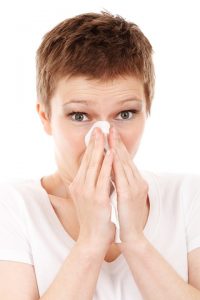
It’s no secret that this year’s flu season is coming up. The average adult suffers from one to six colds each year and about two-thirds of them are usually upper respiratory infections. Many people wonder if exercising when you’re sick has any affect on the severity or length of a cold.
Most experts recommend that if your symptoms are above the neck and you have no fever, it’s probably safe to perform basic exercise. Intensive exercise, however, should be postponed until a few days after cold symptoms have disappeared. If you’re suffering from a severe cold that shows flu-like symptoms such as a fever, extreme tiredness, aching muscles and/or swollen lymph glands, then you should wait at least two weeks before you resume intensive exercise.
In some cases, there are things that you can do to prevent a cold so you can keep your fitness program on track. Here are some tips that help you fight off the flu:
- Eat a well-balanced diet. The immune system depends on many vitamins and minerals for optimal function. A good rule is to eat 10-15 calories per pound of your desired body weight. If your ideal weight is 120 lbs, then consume 1,200-1,800 calories a day (1,200 for sedentary individuals and 1,800 for extremely active people.)
- Avoid rapid weight loss. As the old saying goes, “Feed a cold, starve a fever!” Low-calorie diets, long-term fasting and rapid weight loss have been shown to weaken your immune system.
- Obtain adequate sleep. Major sleep disruption (e.g., three hours less than normal) has been linked to immune suppression. Experts suggest that you try to get at least 8 hours of sleep each night.
- Avoid over-exercising and chronic fatigue. Keep vigorous workouts and race events as far apart as possible. Stay within your limits and don’t push beyond your ability to recover.
- Wash your hands frequently. Washing your hands with soap and hot water is often your best prevention method.
- Avoid putting your hands near your eyes, nose or mouth. Most bacteria and germs are spread from a surface to your hands, then to your face – not by air.
- Get a flu shot. Do this especially if you have a weakened immune system.
- Drink more water. In the fall and winter, it is easy to overlook your thirst and get dehydrated. Make sure you consume a minimum of 8 glasses a day.
- Continue a moderate exercise program. Try to maintain a consistent exercise routine but don’t over-do it. And remember, if you’re suffering from flu-like symptoms, try to wait until they’re over before you go all out.
- Limit alcohol intake. Alcohol can be dehydrating which, in turn, may decrease your resistance to bacteria.
- Let yourself rest. If you are less than 100% you will feel better and recover faster if you let yourself rest.

